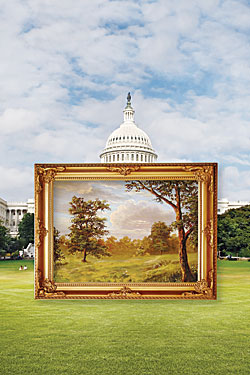|
And
despite its title, Beam’s article is far from entirely negative. For one thing,
the author acknowledges our philosophy’s deep historical roots. “Every political
group claims the [American] Founders as its own,” he writes, “but libertarians
have more purchase than most. The American Revolution was a libertarian movement,
rejecting overweening government power. The Constitution was a libertarian
document that limited the role of the state to society’s most basic needs.” Beam
further recognizes that “libertarianism is more internally consistent than the
Democratic or Republican platforms,” given that it encompasses both economic and
social liberty. “There’s no inherent reason that free-marketers and social
conservatives should be allied under the Republican umbrella, except that it
makes for a powerful coalition.” It’s a marriage of convenience, since
libertarians actually straddle the current partisan split.
Alas, although most of
the essay is fair and factual, and might well leave a reader feeling rather
positive toward libertarianism, Beam jams his many criticisms into the final
quarter of the piece. The gist of his attack is that libertarianism is “oversimplified,”
that it doesn’t “deal with reality as it exists.” In the end, he writes,
“Libertarian minarchy is an elegant idea in the abstract. But the moment you get
specific, the foundation starts to crumble.”
It would take me a year
to challenge all of Beam’s
illiberal
beliefs in detail, but seeing as he himself provides little or no support
for his (yes, oversimplified) arguments, the briefest of retorts should suffice.
Here, then, are my bite-sized responses to 12 of Beam’s arguments(1)
against libertarianism:
 •
Adopting a gold standard would lead to economic meltdown. •
Adopting a gold standard would lead to economic meltdown.
The only support Beam provides for this belief is that “most economists agree”
with it. Whether or not he’s right about what a majority of economists think,
various gold standards did in fact exist prior to the First World War—and they
were generally much more successful at avoiding economic meltdown than fiat
currencies have been.
• We need a central bank to print money.
Without a central bank, Beam writes, “you’d have a thousand banks with a
thousand different types of currency.” He then adds, in parentheses, “Some
libertarians advocate this,” as though it were a crazy thing to advocate. But
surely Beam is aware that the United States was without a central bank from 1837
to 1913, when the Federal Reserve was created. Canada did not have a central
bank until 1934. And yes, in those benighted times, individual banks did in fact
print their own currencies. But the sky did not fall, nor did chaos rein. As
Robert P. Murphy points out in his
recent response to Beam’s article, “There
are strong market forces limiting the number of different kinds of underlying
money, because the whole purpose of money is to provide a common good against
which all other items can be traded.” (Emphasis in original.)
• The Federal Reserve was created in order to reduce economic uncertainty.
This bare assertion is surely the reason given to justify the creation of the
Fed, but the crucial question is whether or not it succeeded in this task. Prior
to its creation, booms and busts (aided and abetted by other government
regulations) had usually been of short duration, normally lasting less than two
years and never more than four. Subsequent to the creation of the Fed, we got
the Great Depression, which began in 1929 and did not truly end until after
WWII, sixteen years later. We also got stagflation in the 1970s, and of course,
our current financial mess, which is far from over.
• Without a welfare system to cover basic needs, people will start stealing.
This is another bare assertion, but in a free market, all who are willing and
able to work will find work at wages determined by market forces. Those
unwilling to work but willing to steal are undeserving of sympathy and should be
dealt with as the thugs they are. As for the small minority truly unable to work,
they would presumably also be unable to steal. At any rate, they would have to
rely on voluntary charity. The alternative is for government actors to steal on
their behalf, which, for all its ersatz legitimacy, is no better from a moral
standpoint.
• Without government schools, some people would remain uneducated.
That may well be, but with government schools, many remain uneducated
today, diploma notwithstanding. A free market in education would reward good
schools and good teachers. It would promote research and innovation instead of
blindly adopting passing fads. It would provide accountability instead of
helping mediocre educators hang on to their sinecures. And in general, as with
all markets, it would drive prices down and quality up. More people would be
educated, and better educated, in a free market.
|

